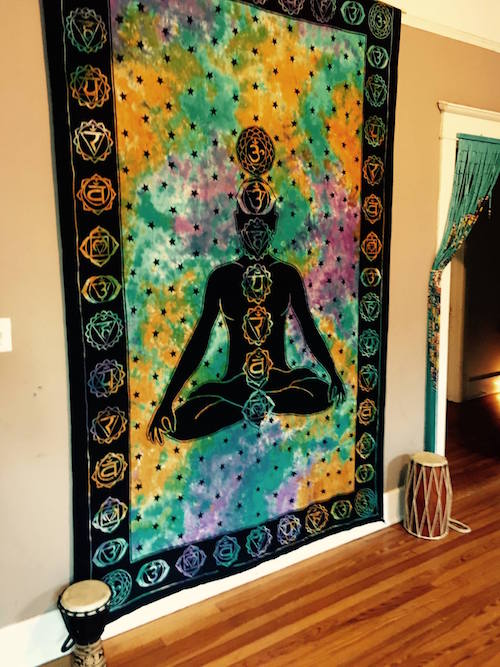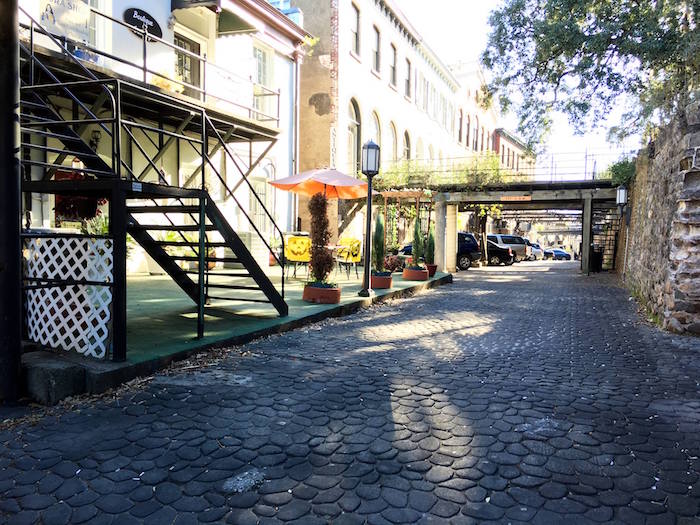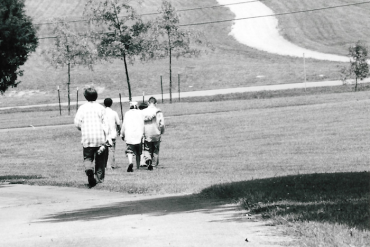“Fruit, granola, banana bread…” I added a box of Triscuits to the bag and scanned the back seat of the car. “Tent, gear, camera…” Then I thumbed through a folder that sat atop the dashboard. When there was nothing else to double-check, I took a deep breath, put the car in drive, and began the daylong journey from Mobile, Alabama to Savannah, Georgia.
I had never taken a road trip before. Hell, I had never taken any trip by myself. Even my weekend-long excursions to Asheville were partnered endeavors. The time had finally come. After months of saving and planning, I began my solo trek up the east coast.
I rolled down the windows. A feeling of agency and joy ballooned in my chest and manifested into a grin. With a few miles of interstate behind me, I started the audiobook Eat, Pray, Love, and just like that, Elizabeth Gilbert was sitting in the passenger seat.
But what I had expected to be a cheerful anthology of traveling anecdotes turned out to be something else. Chapter one became a prayer, a prayer similar to ones that I had cast a few months prior:
I am in desperate need of help. I don’t know what to do. I need an answer. Please tell me what to do. Please tell me what to do. Please tell me what to do.
My smile vanished. The euphoria abated. I put both hands on the wheel as though the wheel were a buoy, as though my hands could keep me from sinking. Here it is, I thought. The truth.
The truth: curiosity didn’t inspire this trip—grief did. The truth: I was still profoundly broken. The truth: I could not leave my brokenness in Alabama.
The truth: I was alone.
My first Couchsurfing hosts would be the Savannah Tribe Intentional Community (STIC), a commune seated right in the heart of Savannah. It was dusk when I arrived. Laurel Fish, brainchild and head of the tribe, showed me around the two-story residence. “What inspired you to start a commune?” I asked her. “I belonged to a Native American tribe until the age of ten,” she answered. “It’s who I am.”
She took a moment to articulate her vision for the commune. “Everyone contributes in some way,” she said. “We’re gonna have regular music gatherings and yoga classes soon. We’ve got a garden in the back. And we’re starting a community garden in a nearby lot. We’re permaculturalists.” I filed that word somewhere in my limbic system and followed Laurel upstairs.

“This is the yoga room. You’re welcome to sleep here if you have a sleeping bag.” “Thanks,” I replied. “Oh,” she added, “Make use of that balcony.”
Heavy-eyed and a little overwhelmed, I retrieved my sleeping bag from the car and rolled it out in the yoga room. Then I found a spot on the balcony to reflect on the day. Little gusts of autumn washed over me while I sat in silence, eyes closed, listening to the vehicles rush by below. I felt both light and heavy—light for jumping headlong into such an adventure, heavy from the unwelcome company of self-doubt. What are you doing? it nagged. Why are you here? Isn’t this just a big waste of time and money? Do you really think—
“Hello there. Mind if I join?” A fellow named Albert saved me from my internal dialogue. “Not at all,” I replied, relieved. “What’s your story?”
Albert, it turned out, was a life-long activist. He was involved in demonstrations spanning Vietnam and the Civil Rights movement to the more recent Occupy Wall Street protests. I took the opportunity to ask him about permaculture.
“Permaculture is sustainable agriculture,” he explained. “Think about factory farming. Big Ag uses the land for mass production, replaces ecosystems with environmentally detrimental monosystems, and then turns to pesticides to fix the very problems it creates. Permaculturalists want to answer natural problems with natural solutions.”
“Winning a war against Big Ag seems like a really tall order,” I said. “Do you believe that kind of change is actually possible?” He smiled. “It’s a process. You learn to quit supporting systems that promote convenience, systems that destroy the earth. You learn to recognize the greed in yourself that those systems are exploiting.”
I thanked Albert for his wisdom and retired to the sleeping bag. I could still hear the cars whooshing by outside. A streetlight painted the walls in melancholy blue-white. Too lonesome to sleep, I slipped in my headphones. Elizabeth Gilbert laid down beside me, picking up where she left off:
They come upon me all silent and menacing like Pinkerton Detectives, and they flank me — Depression on my left, Loneliness on my right. They don’t need to show me their badges. I know these guys very well. We’ve been playing a cat-and-mouse game for years…
“It’s not fair for you to come here,” I tell Depression. “I paid you off already. I served my time back in New York.” But he just gives me that dark smile, settles into my favorite chair, puts his feet on my table and lights a cigar, filling the place with his awful smoke. Loneliness watches and sighs, then climbs into my bed and pulls the covers over himself, fully dressed, shoes and all. He’s going to make me sleep with him again tonight, I just know it.
The next morning, I jogged around Savannah for a couple hours before departing for Asheville. Savannah is a nostalgic place, full of memorial parks, antebellum houses, and wise old oaks bent over and bearded with Spanish moss.


My jog ended and I was back on the road. Whatever residual sadness I carried from the night before was gone as soon as I hit the Blue Ridge Mountains. The trees were burning with color. It took me little under five hours to make it to Asheville, and the closer I got, the more breathtaking the landscape became.
When I arrived in Asheville, I spent the better part of my day wandering the River Arts District (RAD). The RAD, an industrial sector repurposed into a cluster of art studios, sits against the French Broad River, one of the five oldest rivers in the world. After an hour of studio-hopping—clay to glass, wood to textiles—I took respite in the frothy nourishment of Abbey Ale, compliment of The Wedge Brewery. The Wedge interior is small, but it boasts a large, spirited front yard. I watched the locals interact with each other, laughing, bantering, leaning forward with cheeks in hands, painting stories with big gestures and loud baritone voices, a lesbian couple watching their kids throw beanbags, a photographer hunting for the right shot. It’s a souly city, Asheville—big-hearted and unmoved by pretense. My kind of place.

Evening came, and it was time for me to find my couch-surfing host. This time around, I’d be crashing in downtown Asheville with a guy named August Pope.
One thing I’ve learned about couch-surfing is that you never know what you’re gonna get. My experience with the Savannah Tribe was relaxing. Perhaps that’s what I was expecting when I walked the steps to August’s apartment. I planned on getting up early the next day, so I looked forward to a rather uneventful night. I’ll just ask him about his travels and thank him for his couch, and he’ll get the message. (This is how introverts function, if you didn’t know. We always have an escape plan.) I arrived at the door and knocked.
The door flung open.
“DUUUUUUUUUUUUDE!!“
I almost fell backwards. August was a seven-foot force of nature. He was also an 11 on the bro-scale. “You MADE IT, man!” He put out his fist. We fist-bumped.
Oh my god, what have I done? I scanned the perimeter for a window to throw myself out of.
“Want a beer?!” he asked, gesturing for me to sit on the couch. “Yeah, of course!” I answered, feigning bro-thusiasm. He handed me a local brewski. “So you travel a lot?” I inquired. “Yeah, dude. Lived in Prague for a year with a DJ. We made money bar-hopping.” “You made money bar-hopping?” “Yeah, we rounded people up and taxied them to the bars. It was insane.” He paused to take an enormous swig of beer. “What about you, man? You said in your message that you were doing some ‘existential recalibrating.’ What’s that mean?” he asked.
“Went through a breakup a few months ago. I’m just trying to figure out how to think about the future again.”
“Hell dude, I went through that recently too. Dated a girl for six years. I’ll never love anybody else like I love her. But I had to let her go. Wires just kept getting crossed, you know?”
He lifted the bottle for another monstrous gulp.
“The future though. Don’t go thinking about that. Look at you, driving up the coast by yourself. Why don’t you just enjoy it? I mean… oh man, HAPPY BIRTHDAY!”
When I first contacted August on couchsurfing.com a few weeks earlier, I let him know that I’d be coming into Asheville on October 21st, which is indeed my date of birth. Friends and family had texted me earlier in the day, but I had completely forgotten about it. “Dude, you’re gonna LOVE what I’ve got planned for tonight. I’ve got us access to a private singer-songwriter competition, MTV is in town, its gonna be a mess.”
I chugged the rest of my beer. Welp, I thought, so much for an uneventful night.
Our first stop was a pool bar. “There’s this girl, Sara, who keeps blowing up my phone,” August explained. “I invited her to join us. That cool?” “Sure,” I said. And then he slapped the center console so hard that I nearly jumped. “DUDE. You know what? There’s this other chick I know who lives nearby. I could invite her for ya.” I laughed awkwardly. “That’s alright.” “You sure, man? I really don’t mind.” “I’m sure,” I said.
After we picked up Sara, August took the three of us to a singer-songwriter event. There, we drank local beer and listened to some of Asheville’s finest. The last performance was a song about the Gulf Coast. “Bro,” said August, “isn’t that a little crazy? It’s your birthday and this guy is singing about your home.” I laughed. He punched me on the shoulder. I pretended like it didn’t hurt. “That shit’s real,” he said.
We walked around the city for a long time before my eyes began to feel heavy. “August, friend, I think I’m gonna make my way back to the apartment.” “You sure you know the way?” he asked. “Yeah.” “Well, happy birthday, dude.” “Thanks, August.” Thirty minutes later, I closed the door to his apartment and slipped under a single blanket draped across his couch.
In Eat, Pray, Love, Liz Gilbert talks about an internal voice that seems to emerge whenever she needs it most. She speaks of it as though it is the truest, most sacred part of herself. Every time it came up in the audiobook, I recognized it immediately. It was the voice months before that drew me out of bed and to the beach. It was the voice that told me to go couch-surfing up the east coast. And that night, via audiobook, it was the voice that finally put the others to rest:
I’m here. I love you. I don’t care if you need to stay up crying all night long, I will stay with you. If you need the medication again, go ahead and take it—I will love you through that as well. If you don’t need the medication, I will love you, too. There’s nothing you can ever do to lose my love. I will protect you until you die, and after your death I will still protect you. I am stronger than Depression and I am braver than Loneliness and nothing will ever exhaust me.
With that, I put my hand on my heart and fell asleep.
This is part two of a series. If you missed it, check out The End of the World Often Comes (part 1). To continue, move on to From Blue Ridge to Borough (part 3).


